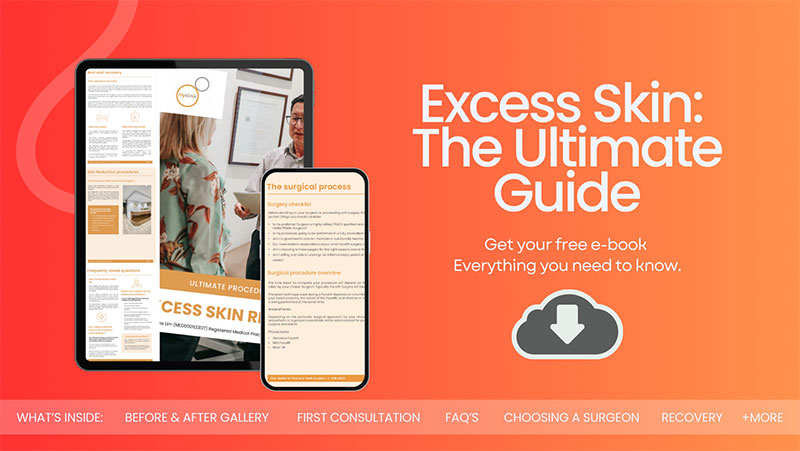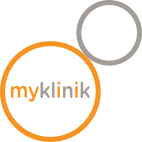The Role of Nutrition after Excess Skin Removal Surgery
As you prepare for excess skin removal procedure, it’s natural to focus on the physical transformation that awaits. However, alongside the anticipation, you might also have questions about recovery. Proper nutrition plays a vital role in this process, influencing how quickly and effectively your body heals.
In this blog, Sydney Plastic Surgeon Dr Jake Lim will explore the connection between diet and post-surgical healing, highlighting the essential nutrients your body needs to rebuild and thrive. By prioritising good nutrition, you’ll be actively contributing to a smooth recovery.
Download Dr Lim’s Free 2024 Excess Skin Surgery Guide

Essential Nutrients during Recovery after Surgery
During the healing process after excess skin removal surgery, your body is working hard to mend tissues and create new ones. To support this internal construction project, you need to provide the right building blocks – essential nutrients. Let’s explore some key players and how you can incorporate them into your diet:
Protein
It’s the main ingredient your body uses to build and repair tissues, including skin, muscles, and blood vessels. Think of protein as the bricks your body uses to rebuild itself after surgery.
A sufficient protein intake helps wounds close properly, reduces the risk of infection, and strengthens your immune system, all of which contribute to a faster and smoother recovery. The good news is that incorporating protein into your meals is quite straightforward. Here are some excellent sources to consider:
- Lean meats like chicken, turkey, and fish
- Eggs: A complete protein source containing all essential amino acids
- Beans and lentils: Plant-based protein options packed with fibre
- Low-fat dairy products like yoghurt and cottage cheese
- Nuts and seeds: A healthy source of protein and good fats
Vitamin C
Vitamin C is another important player in the healing process. It plays an essential role in collagen production, a protein that forms the building block of your skin, tendons, and ligaments. Stronger collagen translates to faster wound healing and improved skin health. Here’s how to ensure you’re getting enough vitamin C:
Citrus fruits like oranges, grapefruits, and lemons are well-known sources of vitamin C, but this essential nutrient can be found in a wider variety of fruits and vegetables:
- Bell peppers: Packed with vitamin C, even surpassing the amount found in oranges! Bell peppers are also a versatile ingredient that can be enjoyed raw, cooked, or roasted.
- Berries: Rich in vitamin C and antioxidants, offering a delicious and nutritious boost. Berries are a low-glycaemic fruit option, making them a suitable choice for people managing blood sugar levels.
- Kiwi fruit: A tropical superstar containing a high concentration of vitamin C, even exceeding oranges on a per-gram basis. Kiwi fruit is also a good source of fibre and other essential nutrients.
- Broccoli: Not just for kids, this versatile vegetable is a surprising source of vitamin C. Broccoli florets can be enjoyed steamed, roasted, or even added raw to salads for a satisfying crunch.
- Papaya: This tropical fruit offers a delightful combination of vitamin C and other essential nutrients like vitamin A and folate. Papaya can be enjoyed on its own, added to smoothies, or incorporated into savoury dishes.
By incorporating these vitamin C-rich options into your diet, you’ll be providing your body with the support it needs for optimal skin health and overall healing.
Zinc and Other Micronutrients

Beyond protein and vitamin C, a range of other micronutrients play a role in supporting your body’s healing process. Here are some options to consider:
- Zinc: This essential mineral supports immune function and wound healing. Good sources of zinc include oysters, lean meats, poultry, beans, lentils, and nuts.
- Vitamin A: Plays a role in maintaining healthy skin and mucous membranes. Vitamin A can be found in orange and yellow vegetables, as well as some dairy products and eggs.
- B vitamins: Support various bodily functions, including energy metabolism and immune function. B vitamins are found in whole grains, legumes, nuts, seeds, and lean meats.
A balanced diet rich in a variety of fruits, vegetables, whole grains, and lean protein sources is the best way to ensure you’re getting all the essential nutrients your body needs for optimal healing.
Hydration during Recovery after Excess Skin Removal Surgery
Water is the foundation of life, and its importance becomes even more pronounced during recovery. Water plays a multitude of roles in the healing process. It transports nutrients to your cells, flushes out waste products, regulates your body temperature, and keeps your skin plump and hydrated – all essential for optimal healing. Dehydration can slow down recovery and even increase the risk of complications. Here are some practical tips to ensure you’re getting enough fluids:
- Carry a reusable water bottle with you and sip on it throughout the day
- Set reminders on your phone to encourage regular water intake
- Include plenty of water-rich fruits and vegetables in your diet, like watermelon, cucumber, and leafy greens
- Opt for herbal teas or low-sugar fruit-infused water for added flavour variety
Dietary Choices for Optimal Healing
The foods you choose play a significant role in how your body heals.
Anti-Inflammatory Foods
Inflammation is a natural response to surgery, but excessive inflammation can hinder healing. Certain foods possess anti-inflammatory properties that can help your body manage the healing process more effectively. Here are some anti-inflammatory heroes to include in your diet:
- Colourful Fruits and Vegetables: These are packed with antioxidants, which fight free radicals that contribute to inflammation. Aim for a rainbow on your plate, incorporating berries, leafy greens, bell peppers, tomatoes, and other vibrantly coloured options.
- Fatty Fish: Rich in omega-3 fatty acids, fatty fish like salmon, tuna, and sardines are known for their anti-inflammatory properties. Aim to include them in your diet at least twice a week.
- Healthy Fats: Certain fats, like those found in olive oil, avocados, nuts, and seeds, also contribute to reducing inflammation. These fats also promote satiety, keeping you feeling fuller for longer.
Limiting Inflammatory Culprits
While some foods promote healing, others can hinder the process by triggering or worsening inflammation. Here’s what to limit in your diet:
- Processed Foods: Often high in unhealthy fats, sodium, and added sugars, processed foods can contribute to inflammation. Opt for whole, unprocessed foods whenever possible.
- Sugar: Excessive sugar intake can increase inflammation and slow down wound healing. Be mindful of hidden sugars in processed foods, sugary drinks, and even some condiments.
- Refined Carbs: White bread, pastries, and other refined carbohydrates can cause blood sugar spikes and contribute to inflammation. Choose whole grains like brown rice, quinoa, and whole-wheat bread instead.
By strategically incorporating anti-inflammatory foods and minimising inflammatory triggers, you’ll be actively supporting a smoother and faster recovery.
Sample Meal Plan for Post-Surgery Recovery
Planning your meals in advance can be incredibly helpful during recovery, ensuring you’re getting the right nutrients and staying on track with your dietary goals. Here’s a sample meal plan to inspire you:
Breakfast

Start your day with a protein-rich breakfast that provides sustained energy:
- Option 1: Scrambled eggs with whole-wheat toast, spinach, and a side of berries
- Option 2: Greek yoghurt with chopped nuts, seeds, and a drizzle of honey
- Option 3: Protein smoothie made with Greek yoghurt, fruit, spinach, and a scoop of protein powder (consult your doctor before using supplements)
Lunch
Focus on a balanced lunch that includes protein, complex carbohydrates, and healthy fats:
- Option 1: Grilled chicken breast on a bed of brown rice with roasted vegetables and a side salad
- Option 2: Lentil soup with whole-wheat bread and a side of avocado
- Option 3: Salmon with roasted sweet potato and steamed broccoli
Dinner
Wind down with a protein-rich dinner that promotes healthy sleep:
- Option 1: Baked cod with quinoa and roasted asparagus
- Option 2: Turkey chili with a side of brown rice and a dollop of low-fat Greek yoghurt
- Option 3: Chicken stir-fry with whole-wheat noodles and a variety of colourful vegetables
Snacks
Healthy snacks can help you stay energised throughout the day and avoid unhealthy cravings:
- Option 1: Apple slices with almond butter
- Option 2: Cottage cheese with berries and a sprinkle of chia seeds
- Option 3: Carrot sticks with hummus
Remember, this is just a sample plan. Feel free to adjust it based on your preferences and dietary needs.
Additional Tips
Beyond dietary choices, there are additional steps you can take to support your recovery after excess skin removal surgery:
Maintaining a Healthy Weight after Surgery
Maintaining a healthy weight is crucial for optimal recovery and long-term success. Significant weight fluctuations after surgery can put strain on your healing tissues. Create a healthy weight management plan that incorporates a balanced diet and regular physical activity (once cleared by Dr Lim).
Supplements
While a well-balanced diet is your primary source of nutrients, certain supplements might be beneficial for post-surgical recovery. However, it’s important to consult Dr Jake Lim before taking any supplements. He can assess your individual needs and recommend appropriate options if necessary.
FAQs about Nutrition during Recovery after Excess Skin Removal Surgery

I’m worried about gaining weight back after surgery. Will focusing on protein make me bulky?
- While protein is crucial for healing, it won’t magically turn you into a bodybuilder! A balanced diet that includes protein alongside healthy carbohydrates, fruits, and vegetables is key. Focus on lean protein sources like chicken, fish, beans, and lentils. Additionally, aim for moderate portion sizes and maintain a healthy calorie intake based on your individual needs and activity level. Consulting a registered dietitian can help you create a personalised plan that supports your healing and weight management goals.
Do I need to take a lot of supplements after surgery?
- A well-balanced diet should be your primary source of nutrients for recovery. However, depending on your individual needs and any potential deficiencies, Dr Lim might recommend certain supplements. For example, in some cases, Dr Lim might suggest a short-term course of vitamin C to support collagen production.
Is it okay to have occasional sugary treats during recovery?
- While occasional indulgence isn’t the end of the world, focusing on a diet rich in whole, unprocessed foods is best for healing. Excessive sugar intake can contribute to inflammation and potentially slow down wound healing. Opt for naturally sweet fruits over sugary treats whenever possible. If you do crave something sweet, consider a small portion of dark chocolate or a fruit salad with a dollop of whipped cream. Remember, moderation is key!
I don’t like vegetables that much. How can I still get the nutrients I need?
- There are many ways to incorporate vegetables into your diet without feeling forced. Explore different cooking methods like roasting, which brings out natural sweetness, or try adding them to smoothies or stir-fries. Leafy greens can be easily blended into sauces or incorporated into omelettes. Be adventurous and experiment with different recipes to find ways to enjoy vegetables!
How long should I focus on this special post-surgery diet?
- While prioritising good nutrition is important for optimal healing in the weeks following surgery, it’s also an investment in your long-term health. Developing healthy eating habits will not only support your recovery but also contribute to your overall well-being. However, the specific timeframe for a post-surgical diet can vary depending Dr Lim’s recommendations and your individual healing process.
Further Reading about Excess Skin Removal Surgery
- Read more about Excess Skin Removal Surgery: What Are ‘Dog Ears’?
- Read more about Will Medicare Cover Skin Removal after Weight Loss?
- Read more about Recovery after Excess Skin Removal Procedures after Massive Weight Loss
- Read more about Rationale Skin Products
- Read more about After Weight Loss
Medical References about Excess Skin Removal Surgery
- Excess Skin Removal: What It Is, Surgery, Procedures – Cleveland Clinic
- Mental and Physical Impact of Body Contouring – PubMed
- Skin removal surgery: Types, recovery, and what to expect – Medical News Today
- Aspects of excess skin in obesity, after weight loss – Science Direct
- Skin Removal Surgery Post Weight Loss – American Board of Cosmetic Surgery




